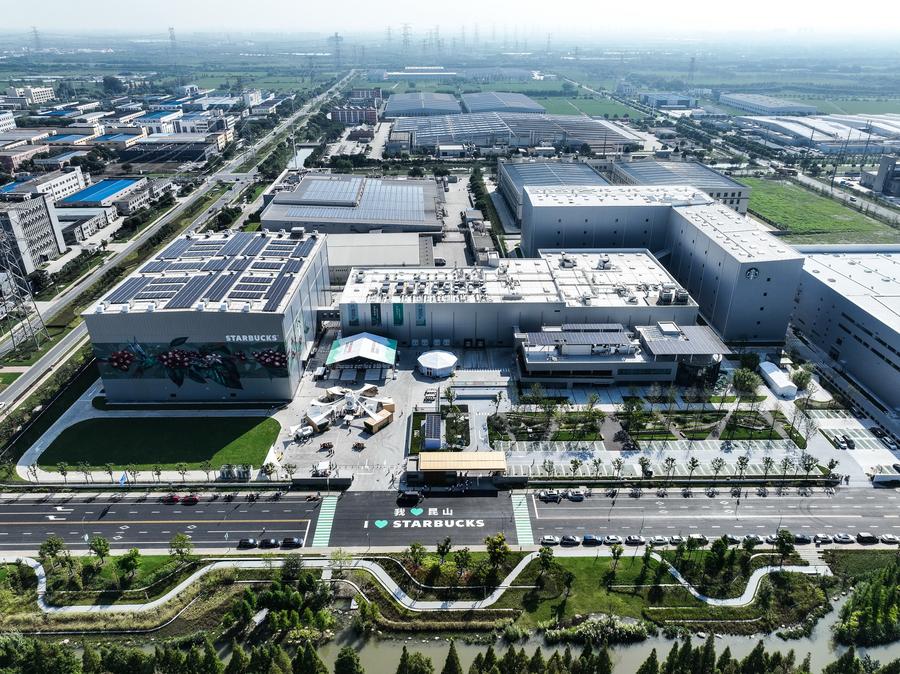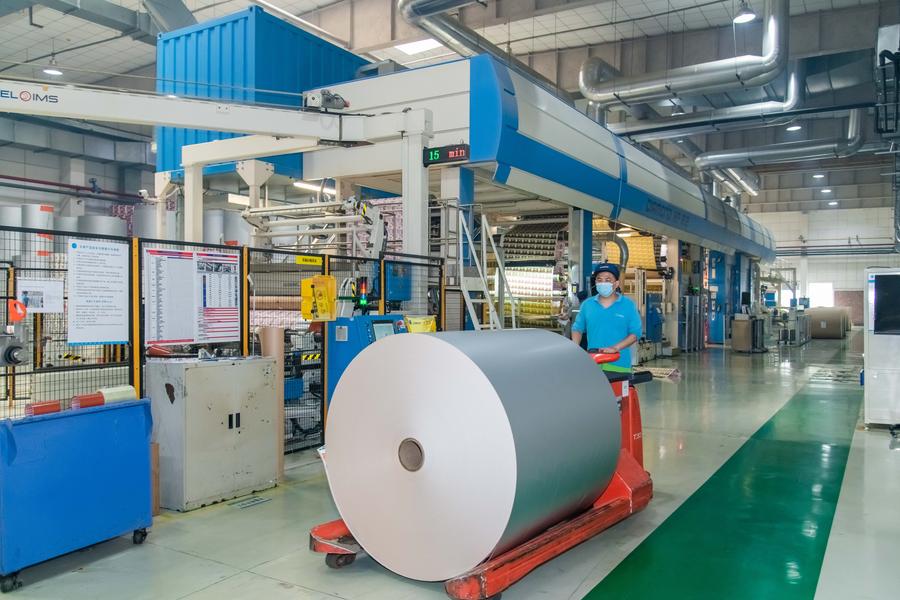How a small Chinese city became a big deal to foreign investors
NANJING, Sept. 21 (Xinhua) -- Ugandan coffee exporter Freedom Amumpaire sensed a fresh business opportunity on his first trip to China this year, not in the bustling metropolises of Beijing or Shanghai, but in Kunshan, east China's Jiangsu Province -- an unassuming city that has become the country's largest coffee hub.
"I plan to visit Kunshan every year to explore partnerships and bring more Ugandan coffee to the world," said Amumpaire.
In May, Kunshan was named the "Capital of the International Coffee Industry" by the International Institute of Coffee Tasters, a prestigious recognition for the city that does not even grow coffee beans.
Kunshan, with an area of just 931 square kilometers, has attracted investment from global coffee giants including Starbucks, Luckin Coffee and Louis Dreyfus, helping it gain a key position in the global coffee supply chain.

This aerial photo taken on Sept. 19, 2023 shows the Starbucks China Coffee Innovation Park in Kunshan, east China's Jiangsu Province. (Xinhua/Ji Chunpeng)
Over the past few decades of opening up, the county-level city, which borders Shanghai, has attracted a stream of foreign investors, helping to usher in an economic miracle that has seen its gross domestic product skyrocket to 514.06 billion yuan (about 72.8 billion U.S. dollars) in 2023 from a modest 242 million yuan in 1978.
INVESTMENT HOTSPOT
According to the Kunshan department of commerce, the city has attracted more than 10,000 foreign-invested projects from more than 80 countries and regions since receiving its first foreign investment 40 years ago.
With less than one-ten-thousandth of China's land area, Kunshan is home to some 1 percent of the country's actual utilized foreign capital, underscoring its strong appeal to global investors.
In September 2023, Starbucks opened its China Coffee Innovation Park in Kunshan. The facility, roughly the size of 11 football fields, was the company's largest manufacturing and distribution investment outside the United States.
Near the factory, there are now over 30 coffee-related companies, forming a 100-billion-yuan industrial chain that includes green bean trading, research, sales and equipment manufacturing.
"The environment here is perfect for developing the coffee industry. We're leveraging our expertise in talent and technology to expand our business," said Nicolas Tamari, CEO of Sucafina, a farm-to-roaster coffee company that has set up its China sales headquarters in Kunshan.
Coffee is merely one thread in the tapestry of Kunshan's industrial prowess. Home to over 20,000 industrial enterprises, the city's primary industries are electronics and equipment manufacturing, with new investments in smart wearables, automotive electronics and new-energy vehicles.

A visitor tries VR-powered gaming at an exhibition hall of a metaverse industrial park in Kunshan, east China's Jiangsu Province, June 1, 2024. (Xinhua/Li Ga)
"Kunshan serves as a window into China's broader success with opening up," said Zhang Erzhen, professor of international economics at Nanjing University.
"By deepening reforms and cultivating a world-class business environment, the city continues to attract foreign companies that benefit from China's huge market and industrial chains, fostering a win-win scenario that boosts innovation and competitiveness."
FIRST-CLASS BUSINESS ENVIRONMENT
At Lamipak's Kunshan factory, which produces milk and beverage cartons, a laminating machine churns out 700 million cartons monthly. The Finnish company, which settled in Kunshan a decade ago, has expanded its investment three times, transforming its local facility into the world's largest and most advanced aseptic packaging plant, with annual sales expected to reach 7 billion yuan.
"The city's infrastructure, government services, and educational resources are incredibly attractive. We're committed to making Kunshan a key base for our operations," said Li Hongbiao, deputy general manager of Lami Packaging (Kunshan) Co., Ltd.

This undated file photo shows a worker operating at Lamipak's Kunshan factory in Kunshan, east China's Jiangsu Province. (Kunshan Integrated Media Center/Handout via Xinhua)
When Starbucks scouted a location for its industrial park in 2019, Kunshan stood out. Local authorities secured the investment in just seven months with a tailored proposal for the coffee giant.
Recognizing that coffee production requires a steady flow of fresh and quality raw materials, Kunshan opened a green customs channel, allowing 90 percent of imported coffee beans to enjoy expedited clearance.
This has helped cut coffee companies' declaration time by half and reduce operating costs by 30 percent. In the first half of this year, Kunshan's green coffee bean imports reached 1.26 billion yuan, a staggering 440 percent year-on-year increase.
Swire Coca-Cola's decision to invest 2 billion yuan in Kunshan in 2023, its largest single investment in China, further highlights the city's appeal.
"A good project needs to land in the right place, and for us, that place is Kunshan," said Dang Jian, CEO of Swire Coca-Cola China, adding that he was impressed by the local government's support.
Kunshan's industrial chain advantage is a major attraction for foreign investors, said Yang Bo, director of the city's commerce department, adding that in the electronics industry, Kunshan and its neighboring cities have over 1,200 primary suppliers and 2,000 secondary suppliers.
"We actively organize networking events for upstream and downstream enterprises to foster connections," said Yang.
Zhou Wei, Party chief of Kunshan, likened the city's relationship with foreign businesses to a romance. "First, we meet, then we get to know each other through professional exchanges, and finally, we fall in love. These companies know that once they take root here, they will flourish," said Zhou.
"I believe these companies are not just seeking favorable policies," he added. "They are searching for a place that truly speaks their language -- a fertile ground where they can grow and thrive."
Photos
Related Stories
- China’s new ‘negative list’ for foreign investment removes all access restrictions to manufacturing sector
- China to lift foreign investment access restrictions in manufacturing sector
- China holds international fair to boost investment, trade
- China to allow wholly foreign-owned hospitals in certain areas
- Mercedes-Benz to increase investment in China
Copyright © 2024 People's Daily Online. All Rights Reserved.









